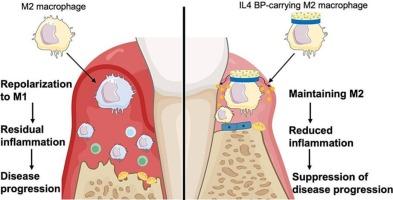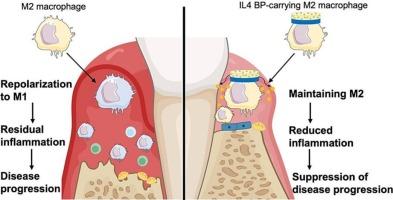Backpack-carrying macrophage immunotherapy for periodontitis
IF 10.5
1区 医学
Q1 CHEMISTRY, MULTIDISCIPLINARY
引用次数: 0
Abstract
Cell immunotherapy is a promising therapeutic modality to combat unmet medical needs. Macrophages offer a prominent cell therapy modality since their phenotypic plasticity allows them to perform a variety of roles including defending against pathogens, inducing/suppressing adaptive immunity, and aiding in wound healing. At the same time, this plasticity is a major hurdle in implementation of macrophage therapy. This hurdle can be overcome by cellular backpacks (BPs), discoidal particles that adhere on the macrophage surface and regulate M1/M2 phenotypic shift in an environment-independent manner. In this study, we engineered IL-4 BPs for maintaining macrophages in the M2 phenotype to regulate excess inflammation in periodontitis, a major oral infectious disease. IL-4 BPs induced and maintained M2 phenotype in macrophages in vitro for several days. After injection of macrophages carrying IL-4 BPs into the gingiva, the cells stayed in the tissue for over 5 days and maintained the M2 phenotype in the disease sites. Furthermore, treatment with IL-4 BP-macrophages significantly suppressed the disease progression. Altogether, a treatment with BP-carrying macrophages offers a promising local therapy against periodontitis.


治疗牙周炎的背负式巨噬细胞免疫疗法。
细胞免疫疗法是一种很有前景的治疗方式,可满足尚未得到满足的医疗需求。巨噬细胞的表型可塑性使其能够发挥多种作用,包括抵御病原体、诱导/抑制适应性免疫以及帮助伤口愈合,因此是一种重要的细胞治疗模式。同时,这种可塑性也是实施巨噬细胞疗法的一大障碍。细胞背包(BPs)可以克服这一障碍,它是一种盘状颗粒,能附着在巨噬细胞表面,以一种与环境无关的方式调节M1/M2表型的转变。在这项研究中,我们设计了IL-4 BPs,用于维持巨噬细胞的M2表型,以调节主要口腔传染病牙周炎的过度炎症。IL-4 BPs能在体外诱导并维持巨噬细胞的M2表型数天。将携带IL-4 BPs的巨噬细胞注入牙龈后,这些细胞在组织中停留了5天以上,并在患病部位保持了M2表型。此外,IL-4 BP-巨噬细胞能显著抑制疾病的发展。总之,用携带 BP 的巨噬细胞治疗牙周炎是一种很有前景的局部疗法。
本文章由计算机程序翻译,如有差异,请以英文原文为准。
求助全文
约1分钟内获得全文
求助全文
来源期刊

Journal of Controlled Release
医学-化学综合
CiteScore
18.50
自引率
5.60%
发文量
700
审稿时长
39 days
期刊介绍:
The Journal of Controlled Release (JCR) proudly serves as the Official Journal of the Controlled Release Society and the Japan Society of Drug Delivery System.
Dedicated to the broad field of delivery science and technology, JCR publishes high-quality research articles covering drug delivery systems and all facets of formulations. This includes the physicochemical and biological properties of drugs, design and characterization of dosage forms, release mechanisms, in vivo testing, and formulation research and development across pharmaceutical, diagnostic, agricultural, environmental, cosmetic, and food industries.
Priority is given to manuscripts that contribute to the fundamental understanding of principles or demonstrate the advantages of novel technologies in terms of safety and efficacy over current clinical standards. JCR strives to be a leading platform for advancements in delivery science and technology.
 求助内容:
求助内容: 应助结果提醒方式:
应助结果提醒方式:


